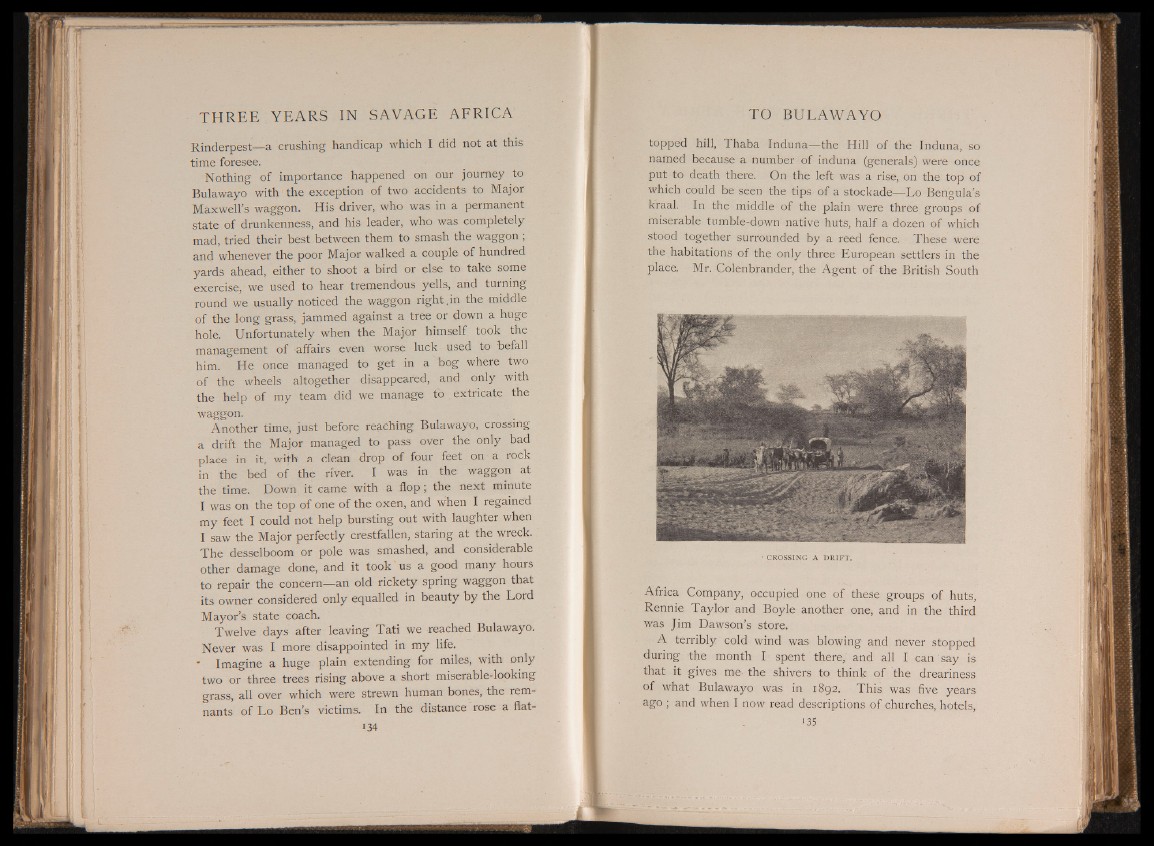
Rinderpest—a crushing handicap which I did not at this
time foresee.
Nothing of importance happened on our journey to
Bulawayo with the exception of two accidents to Major
Maxwell’s waggon. His driver, who was in a permanent
state of drunkenness, and his leader, who was completely
mad, tried their best between them to smash the waggon ;
and whenever the poor Major walked a couple of hundred
yards ahead, either to shoot a bird or else to take some
exercise, we used to hear tremendous yells, and turning
round we usually noticed the waggon right.in the middle
of the long grass, jammed against a tree or down a huge
hole. Unfortunately when the Major himself took the
management of affairs even worse luck used to befall
him. He once managed to get in a bog where two
of the wheels altogether disappeared, and only with
the help of my team did we manage to . extricate the
waggon.
Another time, just before reaching Bulawayo, crossing
a drift the Major managed to pass over the only bad
place in it, with a clean drop of four feet on a rock
in the bed of the river. I was in the waggon at
the time. Down it came with a flop; the next minute
I was on the top of one of the oxen, and when I regained
my feet I could not help bursting out with laughter when
I saw the Major perfectly crestfallen, staring at the wreck.
The desselboom or pole was smashed, and considerable
other damage done, and it took us a good many hours
to repair the concern—an old rickety spring waggon that
its owner considered only equalled in beauty by the Lord
Mayor’s state coach.
Twelve days after leaving Tati we reached Bulawayo.
Never was I more disappointed in my life.
' Imagine a huge plain extending for miles, with only
two or three trees rising above a short miserable-looking
grass, all over which were strewn human bones, the remnants
o fL o Ben’s victims. In the distance rose a flat-
134
topped hill, Thaba Induna—the Hill of the Induna, so
named because a number of induna (generals) were once
put to death there. On the left was a rise, on the top of
which could be seen the tips of a stockade—Lo Bengula’s
kraal. In the middle of the plain were three groups of
miserable tumble-down native huts, half a dozen of which
stood together surrounded by a reed fence. These were
the habitations of the only three European settlers in the
place. Mr. Colenbrander, the Agent of the British South
■ CROSSING A DR IFT .
Africa Company, occupied one of these groups of huts,
Rennie Taylor and Boyle another one, and in the third
was Jim Dawson’s store.
A terribly cold wind was blowing and never stopped
during the month I spent there, and all I can say is
that it gives me the shivers to think of the dreariness
of what Bulawayo was in 1892. This was five years
ago ; and when I now read descriptions of churches, hotels,
'35